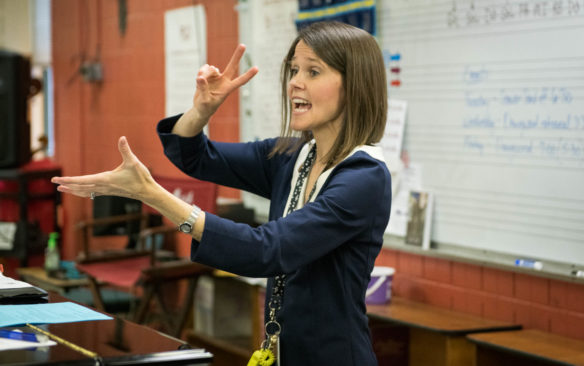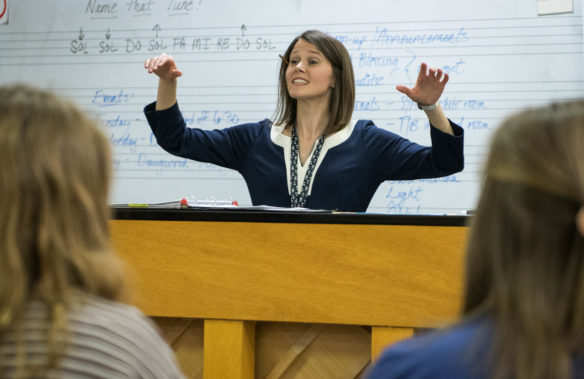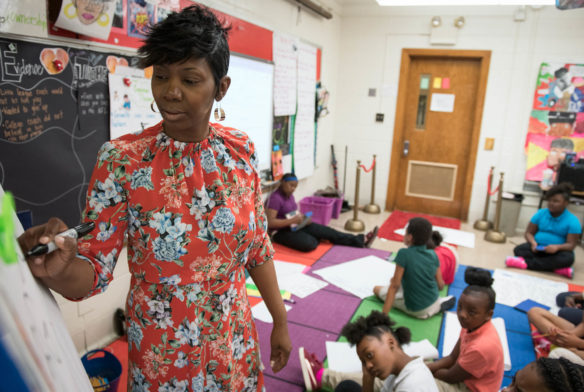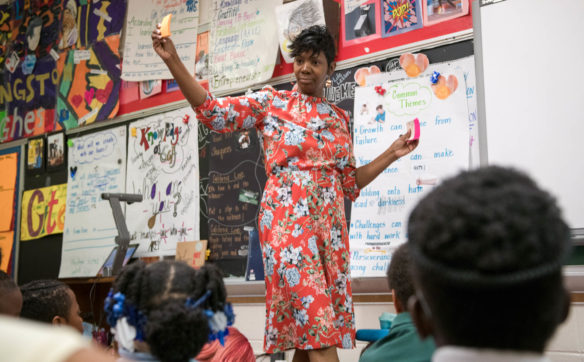By Brenna R. Kelly
Brenna.kelly@education.ky.gov
They teach different age groups, different subjects and in different environments, but the Kentucky Elementary Teacher of the Year and Kentucky High School Teacher of the Year both use the power of music to reach their students.
NyRee Clayton-Taylor, the 2019 Kentucky Elementary Teacher of the Year, uses hip-hop music in her creative writing classes at Jefferson County’s Phillis Wheatley Elementary to help her students showcase their reading and writing skills.
Tiffany Marsh, the 2019 Kentucky High School Teacher of the Year, a choir teacher at Paul Laurence Dunbar High School (Fayette County) uses music to help her students find their voice – both in music and in life.
The two were chosen from among 24 educators who received Valvoline Kentucky Teacher Achievement Awards, a program co-sponsored by Valvoline and the Kentucky Department of Education.
Here is a closer look at the two honorees:

Tiffany Marsh works with her choir students during one of her classes at Paul Laurence Dunbar High School (Fayette County). Marsh was named the 2019 Kentucky High School Teacher of the Year.
Photo by Bobby Ellis, May 4, 2018
Tiffany Marsh
Paul Laurence Dunbar High School (Fayette County)
By junior year of high school Tiffany Marsh knew she wanted to be a music educator. It was watching her choir teacher, Angela Hampton at Floyd Central High School in Indiana, that solidified Marsh’s plan for her future.
“Ms. Hampton’s expectations were high and her passion came through,” she said. “She was a tremendously talented musician and was just very inspiring.”
Marsh can still recall Hampton’s answer whenever someone asked about teaching: “I get to do what I love, amazing.”
That’s how Marsh has felt for the past 14 years. She taught at Western Hills High School (Franklin County) for 10 years, then moved to Dunbar four years ago.
“I see so many good teachers around our building, and have so many colleagues in the music field that I know, I feel like this could have been anybody I know in terms of winning this,” she said. “We all just work really hard for our students.”
For two choir teachers to be honored among the best teachers in the state two years in a row, also brings validation to the importance of arts education in Kentucky, she said. Kellie Clark, a choir teacher in Boone County, was the 2018 Kentucky Teacher of the Year.
“We are legitimate, we do teach in the classroom and we are significant,” Marsh said.
Arts education is often unfairly maligned, she said, but what critics miss is that the goal isn’t just to create artists.
“It’s really to create positive contributors to society,” she said. “We cannot exclude programs and ideas that will help prepare our future citizens to work together, think creativity and play leadership roles.”
Marsh knows most of her students will not become performers or go on to major in music in college, but the skills they learn in her choir or piano classes are will pay off, she said.
“The discipline required in the study and practice of making music, such as learning to focus, learning to listen, creating and responding, those are all skills students will use no matter what career they choose,” she said.
High school is also a critical time in students’ development, when they can learn both about themselves and about contributing to something bigger than themselves.
“I believe that high school is a time for students to begin to find their own voice and to value their own and others’ life experiences,” she said. “I seek to connect them to others, to their community and even to history and culture.”
Not only does music help her student focus, it also allows Marsh to build deeper relationships with them.
“The best teachers I have known have all understood that through positive relationships in the classroom, almost anything is possible,” she said.

Tiffany Marsh has added two new choirs and started offering piano classes during her four years at Paul Laurence Dunbar High School. Photo by Bobby Ellis, May 4, 2018
“There are students in Mrs. Marsh’s room before and after school constantly who are eager to tell her about concerts they’ve seen, play through new songs they want to work on, schedule private lessons, practice for the musical or talk through a school or social issue,” said Tonya Meritt, administrative dean at Dunbar. “It’s clear that Mrs. Marsh’s relationships with her students are genuine and reciprocal.”
In addition to focusing on the individual, Marsh uses team-building activities to foster a sense of community and in turn, elevate her choirs’ performances.
“It’s really crucial to bring students together and have them know one another not just on a superficial level, but really know each other and feel comfortable around each other,” she said, “A lot of music making is connected emotionally, it’s really essential to make better music.”
Since coming to Dunbar, Marsh has added two new choirs, including an ensemble choir and a popular music choir. She also started piano classes that have become so popular some students have to be turned away.
“We are just adding to our program and getting more students involved, it’s exciting,” she said. “I’m always trying to find more kids to be involved in music.”

NyRee Clayton-Taylor discusses how to analyze a story with her students at Phillis Wheatley Elementary School (Jefferson County). Clayton-Taylor was named the 2019 Kentucky Elementary School Teacher of the Year.
Photo by Bobby Ellis, May 1, 2018
NyRee Clayton-Taylor
Phillis Wheatley Elementary School (Jefferson County)
One day as NyRee Clayton-Taylor was repeating 3rd grade after being diagnosed with a learning disorder and behavioral problem, her teacher asked her to dance.
“Mrs. Emory was reading a poem and she asked me to come up and dance it to,” she said. “She wanted me to demonstrate rhythm. She just engaged me in the lesson and after that I just liked her.”
It wasn’t long after that moment that Clayton-Taylor decided she wanted to be a teacher.
“I was looking at the teacher and I was just like, ‘I’m going to be a teacher when I grow up.’ It was just innate,” she said. “I think I just always knew, it was something inside me.”
It was the perfect fit for the little girl who grew up in Louisville’s West End performing for her friends and teaching to her Barbies.
“If you’re not an actress or a singer, then you probably are a teacher,” she said. “You have to use performance skills and that’s what I find myself doing all the time.”
Clayton-Taylor, who has been teaching for 17 years, now uses her performance skills to teach creative writing at Wheatley Elementary in the California neighborhood of the West End. The classes blend hip-hop, reading, writing and project-based learning to create an engaging curriculum that students don’t even realize is instruction, she said.
“I’ve always used hip-hop, I’ve always loved it,” she said. “It’s just something that speaks to kids. I’m just using hip-hop as a hook to teach them differently. Not everything requires you to sit down.”
After examining a text, her students might write a rap song, create a dance or express their thoughts using technology, Clayton-Taylor said.
“I don’t say you have to write a two-page paper, but I say, ‘How are you going to choose to show the information that you want to convey,’” she said.
Students respond to music and can relate to rhythm because they are constantly listening to music or creating it. If students like to drum on the table, she uses it.
“Why are they beating on the table, to beat out beats,” she said. “And if they can beat out beats, they can count. And if they can count, they can do math.”
Clayton-Taylor brought a 13-year-old DJ to her class to show her students how DJs use computer programming. Students practiced with his equipment and learned how to find the beats per minute in songs.
Her students get so excited they don’t realize that they are doing math or writing.
“They will stay after school to write a song,” she said. “And while they are writing the song they are learning fluency, they are learning rhyming words.”

NyRee Clayton-Taylor uses hip-hop music to connect with her students during her creative writing classes at Phillis Wheatley Elementary School. Photo by Bobby Ellis, May 1, 2018
One of her students’ songs, “The new G.O.A.T,” traces the life of Muhammad Ali and compares his life to the lives of Wheatley students. The students created a video for the song and attended the Muhammad Ali Humanitarian Awards, where their video was played and they met Ali’s wife, Lonnie Ali.
“The interesting thing about the curriculum is that it is in full alignment with the standards and fully engages the kids in the culture that they are most familiar with,” said William Bunton, Phillis Wheatley principal.
Before coming to Wheatley, Clayton-Taylor taught in the Fairdale neighborhood, but she eventually decided she wanted to come home to the West End. Working in a Title I school where more than 90 percent of the students qualify for free or reduced-priced lunch presents challenges, she said.
“You have to look at every student, no matter what they come in with, as they are that one,” she said. “They are that one who is going to change this world and I believe that they can.”
MORE INFO …
Tifffany.Marsh@Fayette.kyschools.us
NyRee.Clayton@jefferson.kyschools.us



Leave A Comment